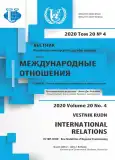Peacekeeping in Foreign Policy of Japan
- Authors: Dobrinskaya O.A.1
-
Affiliations:
- Diplomatic Academy of the Ministry of Foreign Affairs of the Russian Federation
- Issue: Vol 20, No 4 (2020): New Modalities of Regional Peacekeeping
- Pages: 721-737
- Section: THEMATIC DOSSIER
- URL: https://journal-vniispk.ru/2313-0660/article/view/320256
- DOI: https://doi.org/10.22363/2313-0660-2020-20-4-721-737
- ID: 320256
Cite item
Full Text
Abstract
The article analyses Japanese approach towards peacekeeping and issues associated with Japan’s participation in the peacekeeping operations (PKOs). It focuses on factors which influence shaping and transformation of Japan’s approach towards this sphere of UN activity. For the first time, Japan sent its Self-defense forces to participate in the PKO in the early 1990s and since then peacemaking has become one of the symbols of Japan's contribution to international security. Despite the significance of cooperation with the UN that the Japanese government has underlined, the indicators that characterize Japan's participation in peacekeeping remain at a low level. In the article, the author explores the causes of this phenomenon and identifies patterns that characterize the models of Japanese participation in PKO. Using the historical method and content analysis of official documents and speeches by Japan’s representatives the author explores the hypothesis that currently, from the point of view of the Japanese government, the issue of participation in the PKOs is important as a way to adapt the public to the expansion of the sphere of activity of the Self-defense forces, but in practice, the ruling circles seek to avoid the risks associated with the participation of the Japanese military in the PKOs, preferring to shift the focus on peace-building, financial, educational and technological contribution that Japan can make to UN operations. The concept of active pacifism promoted by Abe did not lead to a more extensive participation of the Japanese military in the PKOs. An analysis of current trends in peacekeeping suggests that the participation of Self-defense forces in PKOs will remain at a low level and will be offset by other opportunities for Japan to contribute to international peacekeeping.
Keywords
About the authors
Olga Alexeyevna Dobrinskaya
Diplomatic Academy of the Ministry of Foreign Affairs of the Russian Federation
Author for correspondence.
Email: doa_78@mail.ru
PhD in History, Senior Lecturer, Department of Oriental Languages, Diplomatic Academy of the Ministry of Foreign Affairs of the Russian Federation; Researcher, Institute of Oriental studies, Russian Academy of Science
Moscow, Russian FederationReferences
- Berger, T., Mochizuki, M. & Tsuchiyama, J. (Eds.). (2007). Japan in International Relations. The Foreign Policies of an Adaptive State. Boulder, CO: Lynne Rienner Publishers.
- Calder, K. (1988). Japanese Foreign Economic Policy Formation: Explaining the Reactive State. World Politics, 40 (4), 517—541. doi: 10.2307/2010317
- Dobrinskaya, O.A. (2012). Tokyo: Emphasis on Nonmilitary Aspects of Afghanistan Issue Settlement. Asia and Africa Today, 11, 12—17. (In Russian).
- Dobrinskaya, O.A. (2016). Japan’s Legislation for Peace and Security: Its Global, Regional and National Significance. In: Streltsov, D.I. (Eds.). Yearbook Japan. Moscow: AIRO-XXI publ. P. 61—78. (In Russian).
- Fukushima, A. (1999). Japanese Foreign Policy: The Emerging Logic of Multilateralism. London: Palgrave Macmillan.
- Hatakeyama, K. (2014). Japan’s Peacekeeping Policy: Strategic Calculation or Internationalization of an International Norm? The Pacific Review, 27 (5), 629—650. doi: 10.1080/09512748.2014.948567
- Hook, G., Gilson, J., Hughes, C. & Dobson, H. (2001). Japan’s International Relations. London: Routledge.
- Hynek, N. (2012). Japan’s Return to the Chequebook? From Military Peace Support to Human Security Appropriation. International Peacekeeping, 19 (1), 62—76. doi: 10.1080/13533312.2012.642158
- Inoguchi, T. & Bacon, P. (2006). Japan’s Emerging Role as a “Global Ordinary Power”. International Relations of the Asia Pacific, 6 (1), 1—21. doi: 10.1093/irap/lci133
- Ishizuka, K. (2006). Japan’s New Role in Peace-building Missions. East Asia, 23 (3), 3—21. doi: 10.1007/s12140-006-0007-0
- Kikkawa, G. (2007). Japan and East Timor: Change and Development of Japan’s Security Policy and the Road to East Timor. Japanese Studies, 27 (3), 247—261. doi: 10.1080/10371390701685021
- Kistanov, V.O. (1993). Cambodia as a Testing Ground for Japan’s Diplomacy. In: Sarkizov, K.O. (Eds.). Yearbook Japan. Moscow: Izdatel’stvo MFTI publ. P. 54—65. (In Russian).
- Lam, P.E. (2008). Japan’s Peacebuilding in Mindanao: Partnering Malaysia, the Philippines and the Moro Islamic Liberation Front. Japanese Studies, 28 (1), 45—57. doi: 10.1080/10371390801939096
- Midford, P. (2011). Rethinking Japanese Public Opinion and Security: From Pacifism to Realism. Stanford, CA: Stanford University Press.
- Midford, P. (2019). The Influence of Public Opinion in Foreign Policy in Asia: The Case of Japan. In: Inoguchi, T. (Eds.). The SAGE Handbook of Asian Foreign Policy. London: Sage publishing. P. 381—404.
- Okubo, S. (1997). Japan’s Constitutional Pacifism and United Nations Peacekeeping. In: Hunsberger, W. & Finn, R. (Eds.). Japan’s Quest: The Search for International Role, Recognition and Respect. New York: M.E. Sharpe. P. 96—112.
- Pyle, K. (1996). The Japanese Question: Power and Purpose in a New Era. Washington D.C.: The AEI Press.
- Samuels, R. (2007). Securing Japan: Tokyo’s Grand Strategy and the Future of East Asia. London: Cornell University Press.
- Sato, Y. (2008). Three Norms of Collective Defense and Japan’s Overseas Troop Dispatches. In: Sato, Y. & Hirata, K. (Eds.). Norms, Interests, and Power in Japanese Foreign Policy. New York: Palgrave Macmillan. P. 93—107.
- Singh, B. & Shetler-Jones, P. (2011). Japan’s Reconceptualization of National Security: The Impact of Globalization. International Relations of the Asia Pacific, 11 (3), 491—530. doi: 10.1093/irap/lcr008
- Stengel, F.A. (2008). The Reluctant Peacekeeper: Japan’s Ambivalent Stance on UN Peace Operations. Japan Aktuell: Journal of Current Japanese Affairs, 1, 37—55.
- Tanaka, A. (1994). Japan’s Security Policy in the 1990s. In: Funabashi, Y. (Eds.) Japan’s International Agenda. New York: New York University Press. P. 28—56.
Supplementary files









